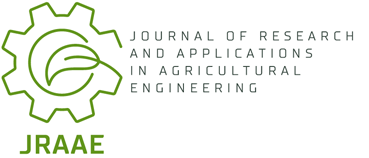Current issue
Online First
Archive
Instructions for Authors
Guide for Authors
Peer Review Policy
Research Ethics Policy
Crossmark Policy
Ghostwriting and Guest Authorship
Copyright
Open Access Policy
Plagiarism
About the Journal
Aim and Scope
Scientific Board
Publisher
Editorial Board
Indexing in Databases
Personal Data Protection
Repository Policy
Contact
ORIGINAL PAPER
Expectations of the polish stakeholders towards the skills and knowledge of the graduates as regards organic food and farming
1
Warsaw University of Life Sciences, Faculty of Human Nutrition and Consumer Sciences, Department of Functional and Organic Food and Commodities ul. Nowoursynowska 159C, 02-776 Warszawa, Poland
Journal of Research and Applications in Agricultural Engineering 2017;62(4):114-119
KEYWORDS
ABSTRACT
The aim of this paper was to analyze the Polish stakeholders from the organic sector in terms of their expectations towards the potential employees and to evaluate what kinds of the professional knowledge and skills are expected by the employers. A survey with stakeholders from the organic food chain was carried out in 2015 in Poland. The investigation has been conducted within a European project “Innovative Education towards the Needs of the Organic Sector” (http://eposproject.net/). A questionnaire with closed-ended questions was created in order to cover a range of different stakeholders. The survey consists of 72 records. Five groups of thematic points were chosen for the publication: (A) Type of graduate for optional employment, (B) Profile of disciplines of graduates, (C) Strategies for recruitment of graduates, (D) Requirements of the job, (E) Innovations in teaching methods. The results indicate that Polish enterprises within organic sector are interested in employing the graduates in organic food and farming studies. There is a need in Poland to create well-constructed university study programs covering organic food and farming. It is necessary to introduce innovative educational methods into the above programs in order to provide the alumni possibilities to acquire skills desired by the employers. Cooperation with enterprises within organic sector is a necessary element of the new created programs as the method to increase practical skills of the graduates and their possibilities to get an interesting job after graduation.
REFERENCES (22)
1.
Bryła P.: Organic food consumption in Poland: Motives and barriers. Appetite, 2016, 105, 737-746.
2.
Buchcic E.: Edukacja na rzecz zrównoważonego rozwoju zadaniem szkolnictwa wyższego. Forum Pedagogiczne, 2016, 2 / 2, 85-94.
3.
Chaplin H., Davidova S., Gorton M.: Agricultural adjustment and the diversification of farm households and corporate farms in Central Europe. Journal of Rural Studies, 2004, 20 (1), 61-77.
4.
Gaweł A., Pietrzykowski M.: Edukacja akademicka w postrzeganiu przedsiębiorczości i kształtowaniu intencji przedsię biorczych. Problemy Zarządzania, 2015, 13, 1 (51), 2. Przedsię- biorczość w XXI wieku: oblicza i wyzwania,| 41-55.
5.
Green, M., Maynard, R.: The employment benefits of organic farming. What will organic farming deliver? Aspects of Applied Biology, 2006, 79, 51-55.
6.
Hameed T.S., Sawicka B.: Farmers' attitudes towards sustainable agriculture practices in Lublin Province. Advances in Sciences and Engineering, 2017, 9, 1, 1-6.
7.
Hilimire K.: Theory and Practice of an Interdisciplinary Food Systems Curriculum.1 NACTA Journal, 2016, 602, 227-233.
8.
Hilimire K., Mc Laughlin B.C.: Students’ Suggestions for Food Systems Curricula at a Liberal Arts College Agroecology and Sustainable Food Systems, 2015, 39, 845-860.
9.
Jagodziński A.: Oczekiwania pracodawców w zakresie kompetencji absolwentów wyższych uczelni. Zeszyty Naukowe PWSZ w Płocku. Nauki Ekonomiczne, 2013, Tom XVII, 87-104.
10.
Kivinen O., Nurmi J., Salminiitty R.: Higher education and graduate employment in Finland. European Journal of Education, 2000, 35(2), 165-177.
11.
Kowalczuk-Vasilev E., Klebaniuk R., Gronowicz K.: Organic food in opinion of students of different years of Lublin universities. Probl. Hig. Epidemiol., 2011, 92(4), 960-964.
12.
Krutílek O., Kuchyňková, P.: Podpora poskytovaná v České republice pro mladé farmáře začínajícís podnikatelskou činností v zemědělství - „Podpory mladým farmářům v ČR“, Centre for Democracy and Culture Study. 2006.
13.
Mondal S., Haitook T., Simaraks S.: Farmers’ knowledge, attitude and practice toward organic vegetables cultivation in Northeast Thailand. Kasetsart J. Soc. Sci., 2014, 35, 158-166.
14.
Mulder M., Kupper H.: The future of agricultural education: The case of the Netherlands. Journal of Agricultural Education and Extension, 2006, 12(2), 127-139.
15.
Nunez G.H., Kovaleski A.P., Darnell R.L.: Formal Education Can Affect Students’ Perception of Organic Produce. Hort Technology, 2014, 24(1), 64-70.
16.
Porceddu E., Rabinge R.: Role of research and education in the development of agriculture in Europe. Developments in Crop Science, 1997, 25, 3-15.
17.
Sawicka B., Umachandran K.: The natural, social, economic and legal aspect of the ecological management system. International Research Journal of Natural and Applied Sciences, 2017, 4, 5, 49-75.
18.
Szczuka M., Tabor S.: Zróżnicowanie działalności dodatkowej w wybranych gospodarstwach ekologicznych. Inżynieria Rolnicza, 2013, 2(143), T. 1, 329-337.
19.
Urbancová H.: The Study from the Czech Republic. The results from the Czech agricultural enterprises in employees development. Manuscript. 2015.
20.
Wheeler S.A.: What influences agricultural professionals' views towards organic agriculture? Ecological Economics, 2008, 65, 145-154.
21.
Willer H., Lernaud J.: The World of Organic Agriculture. Statistics and Emerging Trends 2016. Research Institute of Organic Agriculture (FIBL), Frick, and IFOAM - Organics International, Bonn, 2016.
22.
Yadav D.S., Sood P., Thakur S.K., Choudhary A.K.: Assessing the training needs of agricultural extension workers about organic farming in the North-Western Himalayas. Journal of Organic Systems, 2013, 8 (1), 17-27.
Share
RELATED ARTICLE
We process personal data collected when visiting the website. The function of obtaining information about users and their behavior is carried out by voluntarily entered information in forms and saving cookies in end devices. Data, including cookies, are used to provide services, improve the user experience and to analyze the traffic in accordance with the Privacy policy. Data are also collected and processed by Google Analytics tool (more).
You can change cookies settings in your browser. Restricted use of cookies in the browser configuration may affect some functionalities of the website.
You can change cookies settings in your browser. Restricted use of cookies in the browser configuration may affect some functionalities of the website.


